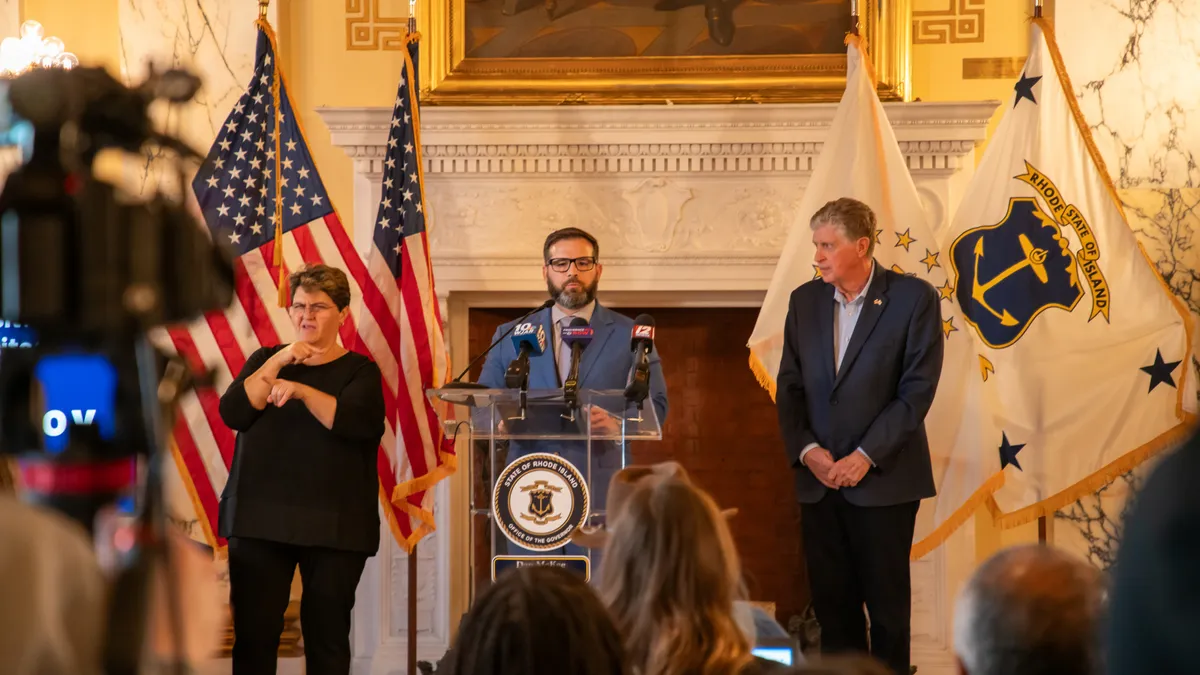If the United States is to be a world leader in 5G technology, it must get government out of the way and allow the private sector to take the lead, officials said last week.
Elected officials that attended a Friday summit on 5G at the White House said it is up to telecom companies to help make sure that the likes of China and South Korea do not pull further ahead, while government must do all it can to not obstruct that innovation.
"There's two paths," Larry Kudlow, director of the National Economic Council, said in a speech at the summit. "One path is the government regulatory path, which we do not favor. The other path is the private enterprise, free market path."
The Federal Communications Commission (FCC) approved a plan last week to streamline the deployment of 5G infrastructure like small cells and cap the fees that cities and other local governments can charge telecom companies to install that infrastructure.
Opponents said it undermines technology initiatives funded by those fees, and local control under the federal Telecommunications Act, with cities and governmental organizations promising to launch legal action against the ruling.
But those in favor of the ruling said it will spur innovation and economic activity. During the FCC's discussions, Commissioner Brendan Carr said that the proposal would cut $2 billion in regulations and stimulate $2.4 billion in new small cell deployment.
That would mean 1.8 million more homes and businesses would be covered, 97% of which in rural and suburban areas, although opponents dispute that.
And while some cities and governmental organizations have threatened legal action over the FCC's decision, saying it may violate the Telecommunications Act and the 10th Amendment of the U.S. Constitution, Kudlow rejected those claims. While he said that the ruling is not meant to trample on the sovereignty of cities and states, it instead prevents onerous fees and regulations from slowing deployment.
"We all believe in the 10th Amendment, but sometimes you have to override, and by the way the 1996 bill permits that kind of override," Kudlow said. "We're not here to be completely heavy-handed, but sometimes you've got to do what you've got to do in some of these states and cities that don't want to cooperate and want to shake us down. We can't allow obstacles and barriers to stop this movement."
Rep. Greg Walden, R-OR, chair of the House Energy & Commerce Committee, said the FCC's ruling was the right one. Earlier this year, the House passed legislation to identify spectrum available for development and use of 5G, and cut the associated paperwork. In a speech at the White House summit, Walden said government must do all it can to encourage innovation and investment.
"What it really comes down to is pushing aside the obstacles the make broadband deployment difficult and clearing the way for innovation," he said. "Industry is not asking the government for money to build 5G networks, they're asking us to cut the red tape that surrounds infrastructure deployment."
But the likes of China and South Korea continue to charge hard on 5G deployment, unnerving many officials as they seek to replicate what happened with 4G rollout. For a time, 50% of that technology was used in the United States, helping foster a new economy built in part by apps like Uber, Airbnb and Lyft.
"Industry is not asking the government for money to build 5G networks, they're asking us to cut the red tape that surrounds infrastructure deployment."

Rep. Greg Walden
Chair, House Energy & Commerce Committee
A study by Deloitte found that China has outspent the U.S. on 5G infrastructure deployment by $24 billion. While explaining his vote at the FCC meeting, Carr noted that China has installed more than 350,000 small cell sites since 2015, ahead of the United States' 30,000 in the same period. Meanwhile, South Korea is recognized as a world leader on spectrum deployment.
"Let there be no mistake: the race to 5G is a sprint, not a marathon," Walden said. "Even as we speak, competitors in Europe and Asia are running full speed ahead to be a global leader."
"It is a race we need to win, and by many accounts we are already behind China and other nations in key areas," U.S. Sen. John Thune, R-SD, said in separate remarks at the White House 5G summit.
In July, Thune and U.S. Sen. Brian Schatz, D-HI, introduced the Streamlining The Rapid Evolution And Modernization of Leading-edge Infrastructure Necessary to Enhance Small Cell Deployment Act (STREAMLINE Small Cell Deployment Act).
In his remarks at the White House, Thune said the FCC's decision was "consistent with the goals" of the legislation, which would update the Telecommunications Act and help streamline infrastructure deployment. That bill came in for criticism from the National League of Cities for undercutting local control, and is highly unlikely to receive a hearing before the mid-terms elections.
Still at issue is the possible impact of the latest round of tariffs on imports from China, which Commissioner Jessica Rosenworcel said will affect equipment such as antennas, switches, routers, equipment for the re-transmission and generation of voice, data and images, as well as circuit boards.
During the FCC's deliberations, she criticized colleagues for being "eerily silent" on the issue of tariffs. At an event hosted by media company Politico beforehand, she said the FCC "can’t afford to put its head in the sand."
But at a press conference after the meeting, Pai, Carr and Commissioner Michael O'’Rielly all seemed unconcerned by the impact of tariffs, and said they were instead looking at the actions the FCC can take.
"We're focused on what the FCC can do to promote 5G deployment," Pai said. "The primary barrier to recognizing the 5G future for American consumers and for American innovators is federal, state and local regulations that impede 5G deployment."
And everyone present pledged to work in partnership with businesses to encourage speedy rollout of 5G infrastructure and spectrum, as they said a free market-based approach will help the United States lead the world. It is a marked departure from earlier this year, when the White House was reportedly exploring building a nationalized 5G network.
"The global competition for 5G leadership will be intense, but I have every reason to be confident that together, we will get the job done," David J. Redl, Assistant Secretary for Communications and Information and Administrator of the National Telecommunications and Information Administration at the U.S. Department of Commerce, said at the White House.
"We need to get on with it," Walden said. "We've made some excellent progress so far, and if we continue to do so I am confident America will win."




















